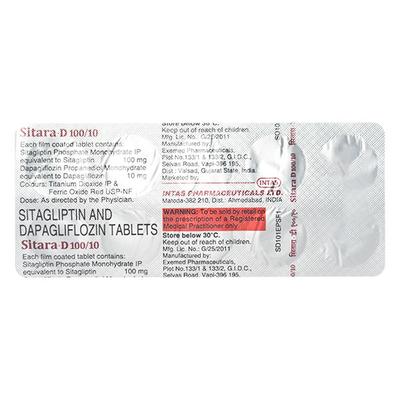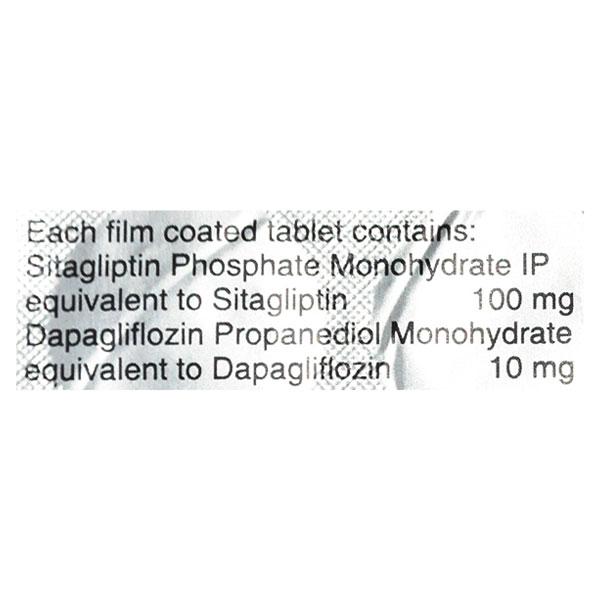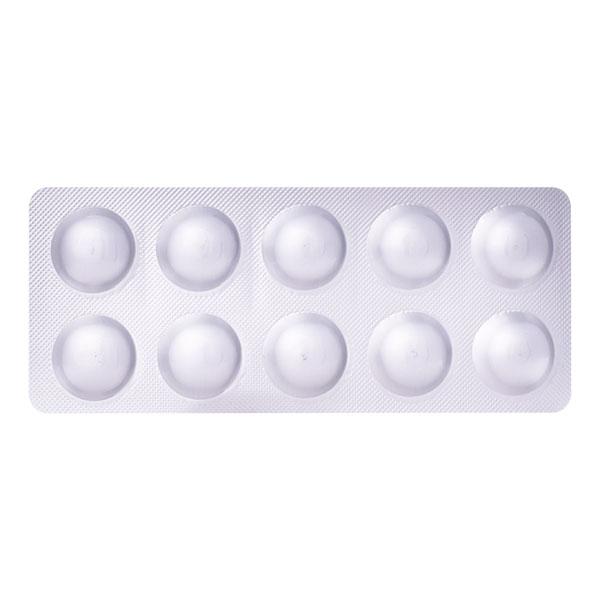

Netmeds First Membership
Quick Links
Introduction About SITARA D 100/10 TABLET
SITARA D 100/10 TABLET is used to manage type II diabetes mellitus which is inadequately controlled on metformin monotherapy. It is a combination of Dapagliflozin and Sitagliptin which belongs to the group of medicines called Antidiabetic agents. It effectively controls blood sugar levels where dapagliflozin inhibits SGLT2, increasing urinary glucose excretion and reducing blood levels of glucose and Sitagliptin inhibits DPP-4, increases glucagon-like peptide-1 (GLP-1) and glucose-dependent insulinotropic polypeptide (GIP), resulting in increased insulin synthesis and decreased glucagon release.
SITARA D 100/10 TABLET is not recommended for use in patients having severe kidney problems or those on dialysis. Before taking the medicine, inform your doctor if you have inflammation of the pancreas, gallstones, alcohol dependence, or very high levels of triglycerides in the blood or any heart, kidney or liver problems. It should be used in pregnant women only if considered clearly necessary. It should be used with caution in breastfeeding women. Safety and effectiveness of SITARA D 100/10 TABLET in children and adolescents (under 18 years of age) have not been established.
It is important to stay on the diet and exercise recommended by your doctor while taking SITARA D 100/10 TABLET as it can help the body use its blood sugar better. The most common side effects are headache, flatulence and constipation. Consult your doctor if any of the side effects worsen or persist for a longer period of time.
Uses Of SITARA D 100/10 TABLET
- Used to manage type II diabetes mellitus (which is inadequately controlled on metformin monotherapy)
How SITARA D 100/10 TABLET Works
SITARA D 100/10 TABLET effectively controls blood sugar levels where Dapagliflozin inhibits SGLT2, increasing urinary glucose excretion and reducing blood levels of glucose and Sitagliptin inhibits DPP-4, increases glucagon-like peptide-1 (GLP-1) and glucose-dependent insulinotropic polypeptide (GIP), resulting in increased insulin synthesis and decreased glucagon release.
How to use SITARA D 100/10 TABLET
- Take SITARA D 100/10 TABLET as advised by your physician
- Swallow the medicine with a glass of water. Do not crush or chew the medicine
- It can be taken with or without food
- Your doctor will decide the correct dose and duration of SITARA D 100/10 TABLET therapy depending on your age, body weight and disease condition.
Side Effects Of SITARA D 100/10 TABLET
Common Side Effects of SITARA D 100/10 TABLET:
- flatulence, constipation, stomach pain, diarrhea
- swelling of hands or legs
- headache, dizziness
- stuffy or runny nose, sore throat
- passing urine more often
- dry mouth
Stop taking SITARA D 100/10 TABLET and contact your physician immediately if you experience any of the following side effects:
- inflamed pancreas (severe and persistent stomach pain that might reach through the back with or without nausea and vomiting)
- serious allergic reaction (rash, hives, blisters on the skin or peeling skin and swelling of the lips, tongue, face and throat that may cause difficulty in breathing or swallowing)
- diabetic ketoacidosis (increased levels of ketone bodies in urine or blood, nausea or vomiting, stomach ache, excessive thirst, fast and deep breathing, confusion, unusual sleepiness or tiredness, a sweet smell to breathe, a sweet or metallic taste in the mouth or a different odor in urine or sweat, rapid weight loss)
- urinary tract infection (fever, chills, burning sensation when passing urine, pain in the back or side, blood in urine)
- low blood sugar levels (shaking, sweating, feeling very anxious, fast heartbeat, feeling hungry, headache, change in vision, and a change in mood or feeling confused)
Warning & Precautions
Pregnancy
Consult your doctorIf you are pregnant or think you may be pregnant or are planning to have a baby, ask your doctor for advice before taking this medicine.
Breastfeeding
Consult your doctorIt is not known if this medicine passes into breast milk. You should not take this medicine if you are breast-feeding or plan to breast-feed.
Driving and Using Machines
Use with CautionDo not drive or operate any machines if you feel dizzy or sleepy after taking SITARA D 100/10 TABLET.
Alcohol
Consult your doctorAvoid consumption of alcohol while taking SITARA D 100/10 TABLET as it may increase the chance of diabetic ketoacidosis.
Kidney
Use with CautionSITARA D 100/10 TABLET can be used with caution in patients who had or have any kidney problems.
Liver
Use with CautionSITARA D 100/10 TABLET can be used with caution in patients with severe liver impairment.
Allergy
ContraindicatedDo not take SITARA D 100/10 TABLET if you are allergic to Dapagliflozin, Sitagliptin or any other ingredients of this medicine.
Heart Disease
Use with CautionSITARA D 100/10 TABLET can be used with caution in patients who have heart failure.
Use In Pediatrics
Consult your doctorSafety and effectiveness of SITARA D 100/10 TABLET in children and adolescents (under 18 years of age) have not been established.
Use In Geriatrics
Consult your doctorNo dose adjustment is required for elderly patients.
Others
SITARA D 100/10 TABLET is not recommended for use if you have:
- type I diabetes mellitus
- diabetic ketoacidosis
Before taking SITARA D 100/10 TABLET inform your doctor if you:
- have inflammation of the pancreas
- have gallstones
- have very high levels of triglycerides in the blood
- are fasting
- are dehydrated
Interactions
A. Drug-Drug interactions:
Before taking SITARA D 100/10 TABLET, inform your doctor if you are taking any of the following medicines:
- Anti-fungal (Ex. ketoconazole, itraconazole)
- Anti-viral agents (Ex. Ritonavir)
- Antibiotics (Ex. Clarithromycin)
- Immunosuppressants (Ex. Ciclosporin)
- Cardiac glycosides (Ex. Digoxin)
- Diuretics (Ex. hydrochlorothiazide, furosemide)
- Anti-diabetics (Ex. metformin, insulin, glimepiride)
Overdosage:
If you or anyone else accidentally takes too much of SITARA D 100/10 TABLET, consult your doctor or visit a nearby hospital immediately.
Synopsis
| Drug | : | Dapagliflozin, Sitagliptin |
| Pharmacological Category | : | Sodium-Glucose Cotransporter 2 (SGLT2) inhibitor, Dipeptidyl Peptidase 4 (DPP-4) inhibitor |
| Therapeutic Indication | : | Type II diabetes mellitus |
| Dosage Forms | : | Tablet |
FAQs About SITARA D 100/10 TABLET
Q: What is SITARA D 100/10 TABLET and why it is prescribed?
A: SITARA D 100/10 TABLET is a combination of Dapagliflozin and Sitagliptin which belongs to the group of medicines called Antidiabetic agents. It is used to manage type II diabetes mellitus which is inadequately controlled on metformin monotherapy.
Q: Does SITARA D 100/10 TABLET cause weight loss?
A: Yes, SITARA D 100/10 TABLET may cause weight loss in some individuals. To avoid weight loss, follow a healthy diet and regular physical activity as advised by your physician.
Q: Can SITARA D 100/10 TABLET be taken along with insulin?
A: Taking SITARA D 100/10 TABLET along with insulin might increase the chance of hypoglycemia.
Q: How does SITARA D 100/10 TABLET work?
A: SITARA D 100/10 TABLET effectively controls blood sugar levels where dapagliflozin inhibits SGLT2, increasing urinary glucose excretion and reducing blood levels of glucose and Sitagliptin inhibits DPP-4, increases glucagon-like peptide-1 (GLP-1) and glucose-dependent insulinotropic polypeptide (GIP), resulting in increased insulin synthesis and decreased glucagon release.
Q: Is SITARA D 100/10 TABLET safe to use in patients with kidney problems?
A: SITARA D 100/10 TABLET can be used with caution in patients who had or have any kidney problems. Your doctor may monitor your kidney function test before and during management with this medicine to manage the risk of any unusual effects.
References
1. KD. Tripathi. Insulin, Oral Antidiabetic Drugs and Glucagon. Essentials of Medical Pharmacology. Eighth edition. 2019. Page – 297 & 301.
2. Serge A. Jabbour; Elise Hardy; Jennifer Sugg; Shamik Parikh. Dapagliflozin Is Effective as Add-on Therapy to Sitagliptin With or Without Metformin: A 24-Week, Multicenter, Randomized, Double-Blind, Placebo-Controlled Study. Journal of Diabetes care. American Diabetes Association. February 2014. [Accessed on 27th November 2023] click here
3. Annaswamy Raji, Zhi Jin Xu, Raymond L. H. Lam, Edward A.O’Neill, Keith D. Kaufman, Samuel S. Engel. Efficacy and Safety of Sitagliptin Compared with Dapagliflozin in People ≥65 Years Old with Type 2 Diabetes and Mild Renal Insufficiency. SpringerLink. August 2020. [Accessed on 27th November 2023] click here
4. Torrent Pharmaceuticals Ltd. Sitaxa D/ Sitalix D/Glucreta S (Dapagliflozin + Sitagliptin). [Revised in July 2022] [Accessed on 27th November 2023] click here
5. Cipla Ltd. Exemed Pharmaceuticals. Darasach S (Dapagliflozin + Sitagliptin). Ciplamed. [Revised in September 2022] [Accessed on 27th November 2023] click here
User Feedback










